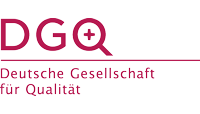5. August 2019
DGQ revises statistic trainings: the focus turns to Data Analytics
In order to entirely prepare quality experts for the current challenges in the area of Data Analytics in production and service, the DGQ is now revising its statistic trainings. Christina Eibert and Michael Sturm from the DGQ product management team answer the most important questions concerning the revised courses.
Why has the DGQ revised the statistic trainings?
The ability to analyse and process big data smartly is becoming increasingly important in times of the digital transformation. Statistical methods and models build the basis for gaining valid insights. In order to ensure that employees can also deal with the current challenges in the area of Data Analytics in production and service, the DGQ has revised and expanded its statistic trainings.
What is so special about the new training concept?
The content of the statistic trainings has been updated and the focus has been shifted towards Data Analytics. For example, new methods for the analysis of big data will be depicted within the training “Analysing Big Data with explorative methods”. The decade-long experience of the DGQ is combined with newly developed solutions for current challenges in the professional analysis of data within these six trainings. The participants of the new trainings will be prepared entirely to improve processes making use of the correct statistical methods and thus ensuring high product quality by meeting the required quality standards. While developing the new courses, the focus was on a simple application of methods. Participants shall acquire the methodology by performing numerous exercises. The DGQ has developed the tools that will be utilized within the trainings. These are partly based on the programming language R and thus enable the analysis of big data.
Which target groups have the trainings been developed for and are there any pre-requirements?
The revised trainings mainly address employees across all industries who wish to exploit the potential of data analysis in their working environment. This can include professionals from research and development, from quality management or from quality assurance. Primarily, the courses address those who wish to deal with current statistical methods, such as explorative processes for the analysis of Big Data or e.g. the very latest reliability analysis. Previous in-depth knowledge in the area of statistics or mathematics is not necessary. The trainings are didactically structured so that they provide all the required mathematical basics. A command of the programming language R is also not necessary.
Why have the training as well as certificate titles changed?
The statistic trainings are newly structured, moreover have been expanded, in terms of content and their focus has been shifted towards Data Analytics. Therefore, the certificate titles have also been updated and adapted according to the qualifications which are provided by the respective training. For example, parts of the trainings “Statistical analytical instrument qualification” and “Statistical process monitoring” have been revised, updated and combined within a new training “Statistical establishment of measurement and test process capabilities”. Thus the “DGQ specialist capability certificate” certifies the respective qualifications. Holders of the certificate “DGQ specialist explorative methods”, which has been developed from scratch, will be able to certify their acquired qualifications in the field of big data analysis.
And what happens to the “old” certificates?
The new trainings along with their certificates have no effect on previously acquired certificates. These will remain valid and certify the respective qualifications.


